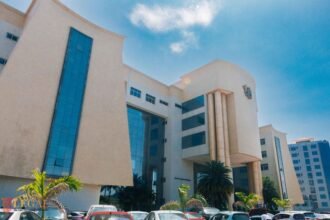
Published March 6, 2025
1. Introduction
As Ghana celebrates its 68th Independence Anniversary, the judiciary remains a cornerstone of democratic governance and the rule of law. Tasked with interpreting and enforcing laws, it has played a critical role in safeguarding constitutionalism, protecting human rights, and fostering social justice. The judiciary’s evolution reflects Ghana’s broader socio-political transformation, where citizens increasingly rely on courts as the ultimate arbiter of justice. As Samuel Adjetey Osekre aptly observes, “Courts are mightier than swords and guns,” underscoring the growing public faith in the rule of law as a peaceful alternative to conflict resolution.
Despite these achievements, challenges persist. Ghana’s judiciary is burdened by resource constraints, corruption allegations, and political interference, which undermine its credibility and effectiveness. According to the Africa Governance Monitoring Project (AfriMAP), “Justice reform in Ghana remains piecemeal and uncoordinated,” highlighting the need for comprehensive reforms to strengthen judicial independence and efficiency.
As Ghana moves forward, it must address these challenges while building on its successes. The judiciary’s role is not merely institutional; it is symbolic of democracy’s promise. As Lionel Osse and Gildfred Boateng Asiamah note, “Access to justice is not just a constitutional right; it is a measure of a nation’s commitment to equality and fairness”. This evaluation examines the progress made by Ghana’s judiciary, identifies ongoing challenges, and explores pathways for reform to ensure it remains a robust pillar of democracy.
2. Judicial Independence
The 1992 Constitution of Ghana enshrines judicial independence as a fundamental principle. Article 125(1) states: “Justice emanates from the people and shall be administered in the name of the Republic by the Judiciary which shall be independent and subject only to this Constitution”. This constitutional guarantee has enabled the judiciary to make landmark rulings that uphold constitutional principles and demonstrate impartiality.
However, Ghana’s journey towards judicial independence has been marked by significant challenges. During the immediate post-independence era, the judiciary faced considerable pressure from the executive branch. A notable example is the case of Re Akoto (1961), where the Supreme Court upheld the Preventive Detention Act, effectively allowing the government to detain individuals without trial. This decision was widely criticized as an abdication of judicial responsibility in the face of executive overreach.
In contrast, the post-1992 era has seen several instances where the judiciary has asserted its independence. For example, in the case of New Patriotic Party v. Attorney-General (1993), the Supreme Court struck down sections of the Public Order Decree 1972 as unconstitutional, affirming the right to freedom of assembly. This ruling demonstrated the court’s willingness to challenge executive actions that contravene constitutional provisions.
More recently, during John Kufuor’s administration (2001-2009), the courts overturned politically motivated dismissals, reinforcing their impartiality. In Tsatsu Tsikata v. Attorney-General (2002), the Supreme Court ruled that the Fast Track High Court was unconstitutional, challenging a key initiative of the government. Although this decision was later overturned, it highlighted the judiciary’s readiness to scrutinize executive actions.
Despite these positive developments, challenges to judicial independence persist. The case of Agyei Twum v. Attorney-General & Akwetey (2005) raised concerns about executive interference when President Kufuor refused to implement the court’s order to reinstate the removed Chief Executive of the Ghana National Petroleum Corporation.
These cases illustrate the ongoing struggle to maintain judicial independence in Ghana, highlighting both progress made since the 1992 Constitution and areas where further improvement is needed. Constitution of the Republic of Ghana 1992, art 125(1). Re Akoto GLR 523. New Patriotic Party v Attorney-General 1993-94 2 GLR 35. Tsatsu Tsikata v Attorney-General 1 GLR 186. Agyei Twum v Attorney-General & Akwetey 2005-2006 SCGLR 732.
3. Human Rights Protection
The judiciary has been a cornerstone of human rights protection in Ghana, particularly through its Superior Courts and institutions like the Commission on Human Rights and Administrative Justice (CHRAJ). Article 33(1) of the 1992 Constitution empowers the judiciary to enforce fundamental human rights, stating: “Where a person alleges that a provision of this Constitution on the fundamental human rights and freedoms has been, is being or is likely to be contravened in relation to him, that person may apply to the High Court for redress.” This constitutional mandate has enabled the judiciary to develop a robust body of human rights jurisprudence.
Judicial Cases Upholding Human Rights
One landmark case is Tuffuor v Attorney-General GLR 637, where the Supreme Court upheld the principle of judicial review, affirming that any act inconsistent with the Constitution is null and void. This case reinforced the judiciary’s role as a guardian of constitutional rights.
Another significant case is NPP v Inspector-General of Police 1993-94 2 GLR 459, where the Supreme Court struck down provisions of the Public Order Decree (NRCD 68) that infringed on the right to freedom of assembly. The ruling affirmed that any law restricting fundamental freedoms must be consistent with constitutional guarantees.
The judiciary has also addressed socio-economic rights. In Centre for Juvenile Delinquency v Attorney-General 2003-2004, the High Court ordered reforms in juvenile detention facilities, citing violations of children’s rights under Article 28(1) of the Constitution.
3.1. Challenges in Judicial Protection of Human Rights
Despite these successes, Ghana’s history reveals instances where judicial protection of human rights was undermined. During the Provisional National Defence Council (PNDC) era (1981–1993), Public Tribunals operated parallel to traditional courts, often disregarding due process and violating basic human rights.
For example, under Law 24, tribunals could convict individuals based on a single witness’s testimony without adhering to procedural safeguards. The Nii Amoo Addy Case exemplifies these abuses, where procedural irregularities led to an unjust conviction under politically motivated charges.
Moreover, in cases like Amnesty International v Ghana Government (1986), international organizations criticized Ghana for detaining individuals without trial under emergency laws. These instances highlighted executive overreach and judicial complicity in human rights violations.
3.2. Gaps in Socio-Economic Rights Enforcement
While civil and political rights have received significant judicial attention, socio-economic rights have been less prioritized. Scholars argue that Ghana’s judiciary has not adopted a consistent approach to these rights. For instance, Atupare notes that “civil and political rights claims are given generous reception while socio-economic rights are often neglected,” creating gaps in Ghana’s human rights jurisprudence.
The judiciary has made remarkable strides in protecting human rights in Ghana but must address historical lapses and ensure equal attention to all categories of rights. A purposive approach to socio-economic claims and vigilance against executive interference will strengthen its role as a protector of fundamental freedoms.
4. Integration of Legal Pluralism
Ghana’s legal system is a unique blend of customary law and Anglo-Saxon common law, reflecting the country’s cultural diversity and colonial legacy. Article 11(1) of the 1992 Constitution explicitly recognizes this pluralistic framework, stating that “the laws of Ghana shall comprise the Constitution, enactments made by or under the authority of Parliament, orders, rules and regulations, the existing law, and the common law,” which includes customary law. This coexistence ensures that traditional norms are respected while aligning with modern legal principles.
4.1. Judicial Cases Demonstrating Legal Pluralism
One significant case that highlights the integration of legal pluralism is Adjei v. Dabanka 3 WACA 46. In this case, the court upheld a customary law principle concerning land ownership but ensured that it did not conflict with statutory provisions. This decision demonstrated how courts balance customary practices with statutory requirements to ensure fairness and constitutionality.
Another notable case is Mensah v Mensah 1998-99 SCGLR 350, where the Supreme Court applied both customary law principles and statutory law in a divorce settlement. The court ruled that although customary marriage practices were valid, they must comply with constitutional guarantees of equality, particularly regarding property distribution upon dissolution of marriage.
In Nana Adjei Ampofo v Attorney-General 2003-2004, the Supreme Court addressed inconsistencies between customary land tenure systems and statutory land laws. The court emphasized that while customary laws are integral to Ghanaian society, they must align with constitutional provisions to prevent abuse or discrimination.
4.2. Challenges in Legal Pluralism
Despite its benefits, legal pluralism in Ghana has led to tensions and inconsistencies. For example, disputes over land ownership often arise due to conflicting interpretations of customary and statutory laws. Women, in particular, face challenges under customary land tenure systems that often deny them equal rights to land ownership. As noted in Awudu v. Kyere 2007-2008 SCGLR 317, the Supreme Court had to intervene to ensure that customary practices adhered to constitutional guarantees of gender equality under Article 17(2) of the Constitution.
Furthermore, during colonial rule, the “repugnancy clause” allowed colonial courts to disregard customary laws deemed inconsistent with European values. Although this clause was abolished post-independence, remnants of its effects persist in judicial attitudes toward certain customary practices. For instance, cases involving inheritance rights under patrilineal systems often require judicial interpretation to reconcile traditional norms with constitutional protections.
4.3. The Way Forward
To strengthen legal pluralism in Ghana, there is a need for continuous judicial training on interpreting customary laws within constitutional frameworks. Additionally, reforms should focus on codifying aspects of customary law to reduce ambiguities and ensure consistency across jurisdictions. As Henrietta Mensa-Bonsu aptly notes: “Legal pluralism must preserve the authenticity of traditional cultures while reconciling them with constitutional principles and modern realities”.
4. Technological Innovations
Recent technological reforms have significantly transformed Ghana’s judiciary, improving efficiency and access to justice. Article 125(3) of the 1992 Constitution mandates that “The judicial power of Ghana shall be vested in the Judiciary; accordingly, neither the President nor Parliament nor any organ or agency of the President or Parliament shall have or be given final judicial power.” This provision underscores the judiciary’s autonomy, which has been bolstered by the adoption of technology to enhance its operations.
4.1. E-Justice Systems
The introduction of e-justice systems, such as electronic filing and case management platforms, has expedited court processes and reduced delays. The E-Transform Project, funded by the World Bank and implemented since 2013, has been a cornerstone of these reforms. By 2024, several courts had adopted paperless systems that allow users to file cases, make payments online, and track case progress digitally. As Chief Justice Anin Yeboah noted during the 2022 Chief Justice’s Forum:
“Technology is key to access to justice… Lawyers can now receive emails about adjournments and track cases electronically”.
The success of pilot programs for virtual hearings during the COVID-19 pandemic further demonstrated the potential of digital tools in ensuring uninterrupted justice delivery. Courts such as the High Court in Accra have embraced virtual hearings, enabling parties to present evidence and arguments remotely.
4.2. Justice for All Programme
The “Justice for All Programme,” launched in 2007, leverages technology to address delays in remand cases. By 2024, this initiative had facilitated virtual court sittings for remand prisoners, significantly reducing overcrowding in prisons. This program exemplifies how technology can bridge gaps in access to justice for marginalized populations.
4.3. Challenges in Technological Adoption
Despite these advancements, challenges remain. The integration of digital systems across all courts has been slow due to inadequate infrastructure and resistance from some legal practitioners. As Korieh Duodu observes: “While Ghana has made confident strides toward digitalization, more needs to be done to ensure that e-justice systems are universally accessible”. Additionally, rural courts often lack the resources needed to implement these reforms effectively.
4.4. Future Directions
To sustain these gains, continuous investment in digital infrastructure is essential. Training programs for judges and lawyers on e-law and cybercrime are also critical. As Chief Justice Gertrude Torkornoo emphasized during a judicial training session: “Judges must develop leadership skills in this arena if they want to remain relevant in the system”. Furthermore, expanding end-to-end digitalization under projects like E-Justice Phase Two will ensure uniformity across all courts.
5. Challenges Facing the Judiciary
5.1. Corruption and Public Perception
Corruption remains a significant issue undermining public trust in the judiciary. Surveys reveal that 97% of Ghanaians perceive judges as corrupt, with political cases often appearing biased toward the executive branch. Such perceptions erode confidence in judicial outcomes and threaten democracy.
5. 2. Political Influence
Despite constitutional guarantees of independence, instances of political interference persist. The Supreme Court has been criticized for rulings perceived to favor the government, earning it labels like “Unanimous FC”. This undermines its role as an impartial arbiter.
5. 3. Access to Justice
Economic barriers such as high legal fees and geographical disparities in court distribution hinder access to justice for many citizens. The Legal Aid Commission operates mainly in urban areas, leaving rural populations underserved. Delays in case resolution further exacerbate these issues.
6. The Way Forward
6.1. Strengthening Judicial Accountability
To restore public trust, stricter mechanisms for monitoring judicial conduct must be implemented. Transparent judicial appointments and robust anti-corruption measures are essential. As noted by ISS Africa, “Justice delayed is justice denied; but justice corrupted is democracy destroyed.”
6. 2. Enhancing Access to Justice
Expanding legal aid services and leveraging technology can bridge access gaps. E-justice systems should be scaled nationwide to expedite case processing while reducing costs. Additionally, mobile courts could address geographical imbalances.
6. 3. Promoting Civic Education
Educating citizens about their legal rights empowers them to seek redress through formal channels rather than resorting to extrajudicial means. Public awareness campaigns can also counteract misinformation about judicial processes.
7. Conclusion
At 68 years of independence, Ghana’s judiciary stands at a crossroads—celebrated for its achievements yet burdened by challenges that demand urgent reforms. As a guardian of democracy, it must act decisively to restore public trust and ensure equitable access to justice for all citizens. “The judiciary is not merely an institution; it is the conscience of a nation’s democracy—a bulwark against tyranny and a shield for the oppressed.”
Andrew Kofi Annan is a legal consultant at Minkah-Premo Osei-Bonsu Bruce Cathline and Partners. He holds an LLM from Kwame Nkrumah University of Science and Technology (KNUST), where he’s also a Graduate Assistant.
References
1. Adjei v Dabanka 3 WACA 46.
2. Agyei Twum v Attorney-General & Akwetey 2005-2006 SCGLR 732.
3. Amnesty International, ‘Ghana: Detention Without Trial Under Emergency Laws’ (1986).
4. AfriMAP, ‘Ghana: Justice Sector and the Rule of Law’ (Africa Governance Monitoring Project) https://gsdrc.org/document-library/ghana-justice-sector-and-the-rule-of-law/ accessed 6 March 2025.
5. Atupare AP, ‘Legitimacy, Judicial Review and Human Rights Enforcement in Ghana’ (2011) http://197.255.68.203/handle/123456789/6800 accessed 6 March 2025.
6. Awudu v Kyere 2007-2008 SCGLR 317.
7. Centre for Juvenile Delinquency v Attorney-General 2003-2004 unreported case cited in CHRAJ reports.
8. Constitution of the Republic of Ghana 1992, art 11(1).
9. Constitution of the Republic of Ghana 1992, art 33(1).
10. Constitution of the Republic of Ghana 1992, art 125(1).
11. Constitution of the Republic of Ghana 1992, art 127(1)-(2).
12. Cyber Security Authority Ghana, ‘Judges Urged to Stay Abreast of Electronic Tools’ (CSA News) https://www.csa.gov.gh/judges-urged-to-stay-abreast-of-electronic-tools.php accessed 6 March 2025.
13. Human Rights Watch, ‘Revolutionary Injustice: Abuse of the Legal System Under PNDC’ (31 January 1992) https://www.hrw.org/reports/pdfs/g/ghana/ghana921.pdf accessed 6 March 2025.
14. Henrietta J.A.N Mensa-Bonsu, ‘Coping with Legal Pluralism’ (D+C Development + Cooperation) https://www.dandc.eu/en/article/coping-legal-pluralism accessed 6 March 2025.
15. Judicial Service of Ghana, ‘Technology is Key to Access to Justice – Chief Justice’ (Judicial Service News Publications) https://judicial.gov.gh/index.php/publications/news-publications/js-latest-news/item/437-technology-is-key-to-access-to-justice-chief-justice accessed 6 March 2025.
16. Judicial Service of Ghana, ‘The Judiciary’ https://judicial.gov.gh/index.php/the-judiciary accessed 6 March 2025.
17. Korieh Duodu, ‘E-Justice: Ghana Makes Confident Strides Towards Digitalisation’ (Addleshaw Goddard Insights, April 2021) https://www.addleshawgoddard.com/globalassets/insights/litigation/e-justice-article-for-ag.pdf accessed 6 March 2025.
18. Lionel Osse and Gildfred Boateng Asiamah, ‘High Cost, Bias, and Long Delays Prevent Ghanaians from Using Justice System’ (Afrobarometer Dispatch No 347, 28 February 2020) https://www.afrobarometer.org/wp-content/uploads/2022/02/ab_r8_dispatchno347_high_cost_bias_delays_prevent_ghanaians_from_using_justice_system.pdf accessed 6 March 2025.
19. Mensah v Mensah 1998-99 SCGLR 350.
20. Ministry of Finance Ghana, ‘Medium Term Expenditure Framework (MTEF) for Judiciary and Judicial Service (2024–2027)’ (Government of Ghana Budget Estimates) https://mofep.gov.gh/sites/default/files/pbb-estimates/2024/2024-PBB-JS_.pdf accessed 6 March 2025.
21. Nana Adjei Ampofo v Attorney-General 2003-2004 SCGLR 411.
22. New Patriotic Party v Attorney-General 1993-94 2 GLR 35.
23. Ntrakwah & Co., ‘AI: IT is Coming!’ (Ntrakwah Ghanaian Law Blog, December 2024) https://ntrakwahandco.com/ai-it-is-coming/ accessed 6 March 2025.
24. Owusu-Dapaa E., ‘An Exposition and Critique of Judicial Independence Under Ghana’s 1992 Constitution’ (2011) SSRN https://papers.ssrn.com/sol3/papers.cfm?abstract_id=2399519 accessed 6 March 2025.
25. Re Akoto GLR 523.
26. Samuel Adjetey Osekre, ‘Courts Over Guns’ (B&FT Online, 30 January 2025) https://thebftonline.com/2025/01/30/courts-over-guns/ accessed 6 March 2025.
27. Stanford Law School, ‘Ghana Judicial Reform’ https://law.stanford.edu/global-trends-in-judicial-reform/ghana-judicial-reform/ accessed 6 March 2025.
28. Tracy Higgins & Jeanmarie Fenrich, ‘Legal Pluralism, Gender, and Access to Land in Ghana’ (2011) Fordham Environmental Law Review https://ir.lawnet.fordham.edu/elr accessed 6 March 2025.
29. Tsatsu Tsikata v Attorney-General 1 GLR 186.
30. Tuffuor v Attorney-General GLR 637.
31. UN Special Rapporteur on the Independence of Judges and Lawyers, ‘Ghana’s Constitution of 1992 with Amendments through 1996’ https://independence-judges-lawyers.org/country/ghana/ accessed 6 March 2025.
32. Valente P., ‘Country Profile: Ghana’ (Stanford Law School Report on Judicial Reforms) http://law.stanford.edu/wp-content/uploads/2023/04/Country-Reports-Ghana-Reforms-1992.pdf accessed 6 March 2025.











